
|
![]()
Greatest Films of the 1930s
1930 | 1931 | 1932 | 1933 | 1934 | 1935 | 1936 | 1937 | 1938 | 1939
Title Screen Film Genre(s), Title, Year, (Country), Length, Director, Description 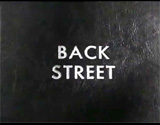

Back Street (1932), 93 minutes, D: John M. Stahl
Director John Stahl's sentimental and romantic, pre-Code 'weepie' melodrama told about an ill-fated romance involving extra-marital and sacrificial love. It was based upon Fannie Hurst's best-selling (and scandalous) 1931 novel (and was remade in 1941 with Charles Boyer and Margaret Sullavan). The film highlighted the long-lasting relationship and steadfast love and devotion between 'mistress' Ray Schmidt (Irene Dunne) and her 'taken' man Walter D. Saxel (John Boles), ultimately a successful financier-banker, that lasted for their entire lifetimes. The early scenes in the film, set in turn-of-the-century Cincinnati, depicted Ray's character as wild, flirtatious, free, independent and carefree (a fun-loving "good-time girl" with multiple suitors). After her initial romantic hook-up with Walter (including an important, but missed chance to meet his mother (Maude Turner Gordon)), they subsequently separated, and then accidentally remet again five years later in New York. Ray decided to surrender to love, gave up her career and financial independence, and became the married man's permanent 'back street mistress' or make-believe wife in the shadows of Walter's married life. The alienated heroine outcast was kept tucked away joylessly in a cheap and tiny apartment while he was married to wife Corinne Saxel (Doris Lloyd) with two children. During some pleasant, secret visits with her in her apartment, Walter enjoyed chocolate and gingerbread, although she mostly experienced shame, loneliness, anguish and the negation of her potential motherhood. In a dramatic, closing death sequence in Paris after Walter had suffered a massive stroke and heart attack, his last thoughts turned to Ray - he could only say her name during his requested final phone call with her before he died. She replied to him: "Walter... yes, I'm here! I'm listening...I can't hear you, dear. What are you trying to say to me?" She intently listened (the phone receiver was set down) as Walter's son Richard "Dick (William Bakewell), who had been holding the phone, reacted to the death: ("Dad, Dad! Nurse! Doctor!"). She heard the doctor's somber pronouncement: ("He's passed on"). Ray screamed out Walter's name in shock and begged: "Don't leave me!" and then collapsed to the floor. Following Walter's death, the tearful Ray sat in mourning in her shabby Parisian apartment, next to Walter's portrait. Walter's repentant son Richard visited Ray, and was now very sympathetic to Ray's feelings of true love and her dire plight. He explained: "His last thoughts were of you, Mrs. Schmidt." He became astonished to learn that she had been sustained or provided for by only $200/month ("You mean everything? Good heavens!"). Because she was not in Walter's will, Richard promised to continue to provide for her well-being. The film's powerful ending visualized a direct but dreamy connection between Walter (represented by a head-shot of his portrait next to her) and Ray when she spoke to him about how nice Richard had been to her, and their missed opportunities together: "Your son is going to take care of me. He was so nice. He might have been my son, our son. I wonder, Walter, what would have happened if I'd met your mother that day in the park." Desperate to be with Walter, she retreated into fantasy and replayed in her mind that she had actually met his mother (Maude Turner Gordon) at a local band concert in the park, who greeted her warmly: "So you are Ray Schmidt. You are nice. My dear, you are all he said you were. And I hope you both will be very happy." In the film's final moments, Ray was able to transcend time and any other barriers (social and physical) that stood between them -- she murmured: "I'm coming, Walter, I'm coming" and succumbed (by slowly bowing her head onto the table holding Walter's portrait).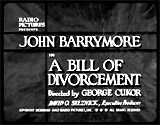

A Bill of Divorcement (1932), 70 minutes, D: George Cukor
George Cukor's family melodrama was based on English author Clemence Dane's popular 1921 play. It had originally been adapted into a silent film drama A Bill of Divorcement (1922, UK), and was also remade in 1940 by RKO starring Adolphe Menjou and Maureen O'Hara. This definitive second adaptation featured a sensitive performance by John Barrymore in the lead role as a troubled patriarch, and Katharine Hepburn in her film debut. Set in England, the film began during a Christmas Eve house party among the stuffy Fairfield family, hosted by wealthy Lady Margaret "Meg" Fairfield (Billie Burke) at her luxurious mansion. Two guests were her flighty, free-spirited, and strong-willed daughter Sidney (Katharine Hepburn) and Sidney's fiancee Kit Humphreys (David Manners). Sidney wanted to postpone their marriage until her mother had completed her marriage to her fiancée Gray Meredith (Paul Cavanagh), an old family friend who had helped her to arrange for a divorce. Over the previous 15 years, Meg's husband Hilary Fairfield (John Barrymore) had been institutionalized and was living in a mental hospital. Sidney had always been told that he was psychotic due to being shell-shocked from the Great War. The next day, news arrived that Hilary had escaped after becoming lucid and sane, and was presumably returning home. Sidney was now told that the family had a history of hereditary mental illness, and she started to believe that she was next. When the long-lost husband Hilary actually arrived at the house, suddenly recovered from his insanity, he found that circumstances at home were now very different during the intervening period of his absence. The family's physician, Dr. Alliot (Henry Stephenson) arrived and explained a dire choice: "Why, face it, man! One of you must suffer. Which is it to be - the whole or the main? The healthy woman with her life before her, or the man whose children ought never to have been born?" The announcement troubled the self-doubting Sidney who began to question her own sanity (and effects on her future childbearing), and her impending 'doomed' marriage to Kit - and she decided to call off their engagement. Dr. Alliot was also able to convince Hilary to briefly return to the asylum and await a formal dismissal and diagnosis. That evening, once Hilary obtained clearance from the institution, he returned to the house and discussed the situation he faced with his ex-wife Margaret. He vacillated between letting her sacrifice herself and fufill her marital vows and obligations by watching after him, or finding true happiness by marrying Meredith. In the conclusion, Hilary pretended to have a temper tantrum, to convince Margaret to leave with Meredith, although he knew he would face a lonely life. Sidney calmed her defenseless father by tearfully embracing him: ("I need you, just as much as you need me"), and assuring him that they would live and be together and be happy. The two sat together at the piano working on possible endings to an unfinished piano sonata that he had written before he left to fight in the war.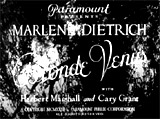

Blonde Venus (1932), 92 minutes, D: Josef von Sternberg
Director Von Sternberg's melodramatic camp classic was the most outlandish of the Dietrich/von Sternberg pictures. Helen Faraday (Marlene Dietrich), a nighclub-cabaret singer, started out as a loving mother and wife. The film opened (during a flashback) with Helen swimming naked in a Black Forest German pond with friends, when she came to the attention of young American scientist-chemist Edward "Ned" Faraday (Herbert Marshall) hiking nearby. Edward was struck with Helen's beauty - love at first sight - and invited her to dinner that evening. After a dissolve to four years later, Edward and Helen were married with a 4 year-old son named Johnny (Dickie Moore) - living in a small NY apartment and struggling to make a living. Her husband, who believed he was dying of radium poisoning, offered his body to the cause of scientific research, but was told there was a cure if he could afford a $1,500 dollar medical cancer treatment-cure in Germany with a reknowned Dresden physician. Helen had already begun to consider returning to her earlier chorus-girl profession, and inquired into working for various theatrical agents in order to pay the expensive medical bills. She was hired by a nightclub manager-owner, took the name Helen Jones, and entered into a glamorous career as a cabaret singer on the stage - billed as the "Blonde Venus" - for $50 dollars/week. The film's highlight was her bizarre, gorilla-suited "Hot Voodoo" number, to the beat of tropical African jungle drums in the crowded cabaret, in which she first took off her hairy-ape/gorilla head-mask and suit to reveal herself. She then sang the throaty song wearing a huge platinum blonde Afro wig, while surrounded by archetypal 'black' native dancers in grass-skirts. As a result of her on-stage success, she drew the attention of wealthy playboy and frequent club patron Nick Townsend (Cary Grant), who offered her $300 dollars as part payment for her husband's treatment. During Edward's absence in Germany, Nick wined and dined Helen, bought out her contract so she didn't have to work, set her up in a beautiful apartment, and financially supported her. As the Hays Code required, she would have to suffer the consequences as a 'fallen woman' who had prostituted herself and become unfaithful. Upon her husband's return after a quick cure, he entered their old empty and dusty apartment, and soon discovered her illicit liaison with Townsend and how she had financed his treatments. Edward threatened to file for divorce and custody of their five year-old son Johnny. Helen fled with Johnny to Baltimore to avoid surrending her son to authorities, where she became employed as a cabaret singer, during a nationwide search being conducted for 'The Blonde Venus'. On the run, she was pursued by a private detective (Sidney Toler) for much of the picture, and soon realized that she would have to continue to evade her husband and the police, an unhealthy condition for Johnny. She turned herself in to the detective in Texas and gave up custody of Johnny to Edward. Helen ended up as an impoverished and destitute prostitute in a French quarter bordello. She eventually pursued further singing opportunities in some of Paris' best nightclubs, where she again rekindled her romance with Nick - as his fiancee. She was encouraged by Nick to return to the US to see Johnny one last time before getting married to him. Back home, she consented to marry Nick if she could be allowed by her estranged husband to see her son for a few minutes at her old apartment. Nick offered to pay Edward for an opportunity to see Johnny - even up to $1,000 dollars a minute. In the concluding turn-around, a sequence of great hope and optimism for their future, Edward realized that Johnny really loved his mother, and that her sacrifice was for his cure - and they were reconciled as a family.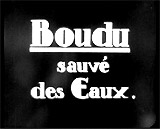

Boudu Saved From Drowning (1932, Fr.) (aka Boudu Sauvé des Eaux), 90 minutes, D: Jean Renoir
Renoir's fourth sound film was an arthouse film of social commentary which shocked and scandalized when first shown. It also was a forward-looking, sophisticated and inventive film with several early experiments with deep focus and nonnaturalistic sound. Its plot was similar to its Paul Mazursky remake: Down and Out in Beverly Hills (1986). Tramp Priape Boudu (Michel Simon) was rescued from a suicidal drowning in the Seine River by Parisian bookseller Édouard Lestingois (Charles Granval). When bum Boudu was provided with shelter in the bourgeois home of benefactors Édouard and Emma Lestingois (Marcelle Hainia), he proved to be ungrateful, loutish, deranged, destructive, lazy, smelly and dirty, rude, disgusting, and salacious. Also involved in the plot was the Lestingois' gold-digging maid Chloë Anne Marie (Sévérine Lerczinska), the husband's mistress. After winning the national lottery by a stroke of luck (finding the winning ticket in a suitcoat given him by Edouard), Boudu married Anne-Marie, but then gave up his comfortable middle-class life and fortune by literally swimming away and reverting to being a tramp.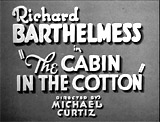

The Cabin in The Cotton (1932), 77 minutes, D: Michael Curtiz
In director Michael Curtiz' drama, rich, young and wicked Southern woman Madge Norwood (Bette Davis) entranced a poor sharecropper's high-school aged son Marvin Blake (Richard Barthelemess), who worked at her father Lane Norwood's (Berton Churchill) company store as a night clerk. When promoted to bookkeeper, he learned how Norwood was cheating the tenant farmers, and was caught in the conflict between his loyalty to his employer, his roots as a farmer, his love for Madge and also for childhood tenant-farmer sweetheart Betty Wright (Dorothy Jordan). The film was known for Madge's famous line: "Ah'd like to kiss ya, but ah jest washed ma hair."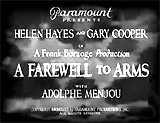


A Farewell to Arms (1932), 78 minutes, D: Frank Borzage
Director Borzage's sentimental, romantic, and moving film was a romanticized version of Ernest Hemingway's tragic love story. A wounded American ambulance driver Lt. Frederic Henry (Gary Cooper) fell in love with British volunteer nurse Catherine Barkley (Helen Hayes), while both serving in the war in WWI Italy. They were both brought together and separated by the circumstances of the war, and the manipulations of jealous womanizer Major Rinaldi (Adolphe Menjou).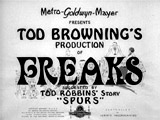


Freaks (1932), 64 minutes, D: Tod Browning
Browning's film, a bizarre MGM horror film, but a cult favorite, was a truly amazing and baroque masterpiece that was banned for many years. It told about a sympathetically-portrayed group of grotesquely deformed circus freaks who were the decent and good individuals in contrast to the truly ugly and evil antagonists that plotted against them - the film's major inverted theme. The film featured many real-life circus sideshow freaks, including "pinheads," a bearded lady, the "living torso" or human worm Prince Randian, Siamese twins Daisy and Violet Hilton, and the half-bodied Johnny Eck, and many others. The film opened with a teaser - a carnival barker sensationalizing one of his sideshow attractions - but hiding its appearance in a pit until he first explained the origin of the creature. In the flashbacked story, beautiful, tall and sexy but heartless high-wire artist Cleopatra (Olga Baclanova) married wealthy circus midget Hans (Harry Earles), but then plotted with her circus strongman lover Hercules (Henry Victor) to poison him to death for his inheritance money. At Hans' macabre wedding feast with a huge communal wine bowl, Cleopatra was ritualistically offered induction into the freaks with the chant: "Gooba-gobble, Gooba-gobble. We accept her. We accept her. Googoo-goggle, Googoo-goggle. One of us, One of us." She humiliated the freaks by piggy-backing Hans onto her shoulders. When her plot to kill Hans was uncovered, in revenge, the group of freaks protected the midget from his bride and got even with the high-wire artist. The freaks sought retribution against strongman Hercules by crawling and slithering in the mud under the carnival's wagons, with knives in their hands, as they pursued him and mutilated him (off-screen). The film returned in its epilogue to a view of the transformed Cleopatra into a legless, feathered chicken or hen - now a real freak - with a scarred and bruised face, drooping mouth, and a squawking mouth - she had been punished for her greed, cruelty and duplicity toward the freaks.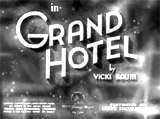


Grand Hotel (1932), 112 minutes, D: Edmund Goulding
This MGM all-star classic film and soap opera won the Best Picture Oscar - its sole nomination. It was the best example of an all-star production heavily bankrolled by the studios. The film set a pattern for future films (known as portmanteau - or anthology - films, centered around an event, person, or location), telling stories about the lives and destinies of several individuals. They included a vivacious office stenographer, a brusque unethical businessman, a ballerina dancer, a gentleman jewel-thief, and a lowly terminally-ill bookkeeper - that were woven together into a whole. In the story, World War I was over, and Berlin's beautiful, art-deco Grand Hotel was busy with the intersecting lives and destinies of its glamorous guests in a 24-48 hour period. The dramatic ensemble cast included a weary, unloved and lonely ballerina Grusinskaya (Greta Garbo), a financially-destitute nobleman and jewel-thief Baron Felix von Gaigern (John Barrymore) who she fell in love with, a sexy, on-the-make stenographer Flaemmchen (Joan Crawford) who met a dying clerk Otto Kringelein (Lionel Barrymore) searching for a last fling, and crude industrialist Gen. Director Preysing (Wallace Beery) seeking a business merger to avoid financial catastrophe. It was famous for highlighting Garbo's oft-quoted line: "I want to be alone."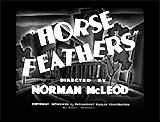

Horse Feathers (1932), 68 minutes, D: Norman Z. McLeod
Horse Feathers was one of the Marx Brother's greatest, most zany films, with numerous one-liners. Groucho was Professor Wagstaff, president of Huxley College, who mistakenly hired Chico, the local speakeasy bootlegger and iceman, and his assistant Harpo, a dogcatcher, as professional football players, so Huxley College could beat their rivals at Darwin. In the big game, Huxley won through madcap maneuvers.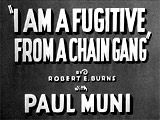


I Am a Fugitive From a Chain Gang (1932), 93 minutes, D: Mervyn LeRoy
This 1930s Warner Bros.' classic, powerful, and realistic social-awareness crime-drama made in the midst of the Depression was about the brutality, barbarism and injustice of prison life. It was effective in bringing about and promoting social reform. The plot was based upon Robert E. Burns' 1932 autobiographical story: "I Am a Fugitive from a Georgia Chain Gang" - serialized in True Detective Mysteries. Escaped Georgia chain gang prisoner Robert Burns, who was living in NJ at the time (and was not able to be extradited back to the South) actually served as a technical adviser to the film, and was secretly brought to Hollywood by the studio to provide assistance during the film shoot. In the film's tale, World War I veteran James Allen (Paul Muni) had returned from the war. As an unskilled worker, he wandered the country, faced unemployment, was treated as an outcast, and was on the verge of destitution and pennilessness. He unsuccessfully attempted to pawn off his war medal, a Belgian Croix de Guerre, when the owner already had a drawer case full of medals from other unemployed, vagrant veterans. During an incident at a roadside diner, he was falsely arrested for being at the scene of a $5 dollar armed robbery (theft of hamburgers), was convicted, and then sentenced to ten years of hard labor for a crime he didn't commit. He was continually portrayed as suffering and trapped in a brutal Southern chain gang (located in Georgia presumably, but not explicitly named). Prisoners were treated inhumanely and sadistically by the guards. After a prison escape through the swamps (and pursuit by bloodhounds), he reestablished himself in Chicago with a normal life and new name (Allen James), and went to work for a Chicago engineering firm. His loathsome landlady Marie (Glenda Farrell), who knew of his conviction and escape, threatened blackmail unless he agreed to marry her. Then, he fell in love with Helen (Helen Vinson) who was unaware of his past, and when he asked Marie for a divorce, she vengefully informed on him. Community groups rallied to his defense to advocate light treatment, and he was offered a symbolic punishment - 90 days of easy clerical work. He voluntarily submitted and was returned to the South, with a promise that he would be pardoned. But then, upon his return to prison, he was again back on the brutalizing chain gang where he was forgotten. Again he escaped, facing even tougher times after fleeing to the North. The film was known for its very chilling and despairing climax when he appeared to Helen outside her Chicago house during a dark night. When she desperately asked: "How do you live?", he responded bluntly: "I steal!"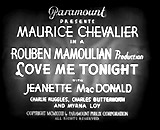


Love Me Tonight (1932), 104 minutes, D: Rouben Mamoulian
Director Rouben Mamoulian's adaptation of Rodgers and Hart's Broadway musical featured innovative direction and editing - and was one of the best musicals of its time. At a pivotal point in cinematic history, it shaped the technical language of movie musicals for years to come at the dawn of the sound era, by smoothly integrating the songs into the film's plotline. It also featured the first zoom shot (into a window) and the first asynchronous sound, and also other dazzling special effects such as slow-motion, fast-motion, and split-screens. This was the romantic tale of a Parisian tailor Maurice Courtelin (Maurice Chevalier) who tried to win the heart of a princess, Princess Jeanette (Jeanette MacDonald). It included the songs "Lover," "Mimi," and "Isn't It Romantic?"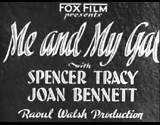



Me and My Gal (1932), 79 minutes, D: Raoul Walsh
This low-budget, fast-talking, pre-Code streetwise romantic comedy (with crime drama elements) was a pre-Prohibition film (alcohol was outlawed in 1933) that actually celebrated drinking. In the story, fresh young New York pier beat-cop Danny Dolan (Spencer Tracy) fell in love with sarcastic, strong-minded waterfront cafe waitress Helen Riley (Joan Bennett), while Helen's newly-married sister Kate (Marion Burns) still harbored feelings for an ex-boyfriend - gangster fugitive Duke Castenega (George Walsh, the director's brother), and hid him in her attic. One drunken character, the father of the bride, approached the camera and asked: "Who'd like a drink, huh?"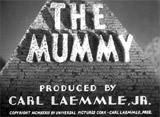

The Mummy (1932), 73 minutes, D: Karl Freund
This classic, atmospheric, expressionistic, creepy pre-Code Universal Pictures horror film was by German director Karl Freund (with his first and most famous US film). The opening title screen after the credits told: "This is the SCROLL of TOTH. Herein are set down the magic words by which Isis raised Osiris from the dead. Oh! Amon-Ra--Oh! God of Gods -- Death is but the doorway to new life --- We live today-we shall live again--In many forms shall we return-Oh, mighty one." British archaeologists in the early 1920s in Egypt, led by Sir Joseph Whemple (Arthur Byron) and Dr. Muller (Edward Van Sloan), discovered that the mummified 3,700 year-old ancient Egyptian high priest Im-ho-tep (Boris Karloff in his second horror starring role) had not been eviscerated, but wrapped as a Mummy and buried alive in a "sensationally unpleasant manner...he struggled in the bandages." He had been 'executed for treason' or possibly for a "sacrilege." He had been "sentenced to death not only in this world but in the next." An engraving on the wooden chest found inside the sarcophagus of the Mummy was translated - - revealing a terrible death curse: ("Death, eternal punishment, for anyone who opens this casket. In the name of Amon-Ra, the king of the gods"). He had been sentenced to the live burial for a forbidden act of sacrilege - for attempting to revive a sacrificed vestal virgin whom he loved named Princess Ankh-es-en-Amon (Zita Johann), a priestess of the temple of Karnak, and the daughter of Pharoah Amenophis. The Mummy dramatically awakened and came to life after archaeologist Sir Joseph Whemple's assistant Ralph Norton (Bramwell Fletcher) from Oxford foolishly opened the chest (out of curiosity) and removed the ancient and sacred Scroll of Thoth with which Isis raised Osiris from the dead, according to ancient mythology. After unrolling the parchment, Ralph began to read a translation of the words, causing Imhotep's slow resurrection from his coffin before escaping. In a frightening sequence, the first movements of the animated mummy were revealed. The reaction of assistant Ralph Norton to the phenomenon -- instant insanity -- included uncontrollable screams and hysterical laughter, as he described to Sir Joseph Whemple what had happened: "He went for a little walk. You should have seen his face." Later, Norton "died laughing, in a straitjacket." The remainder of the film was set 10 years later in 1932 - when Im-ho-tep - now resurrected (and disguised) as a modern Egyptian historian named Ardath Bey, met with son Frank Whemple (David Manners) and Professor Pearson (Leonard Mudie) and suggested that they dig to find the unplundered funerary tomb of the princess Ankh-es-en-amon - it would be the "most sensational find since that of Tutankhamen." Helen Grosvenor (also Zita Johann) - the half-Egyptian daughter of the English governor of the Sudan - appeared at a fancy dress ball, and showed signs that she was somehow connected to the recent dig's findings and to Ardath Bey's incantations. She went into a trance, and after fainting, she uttered words in ancient Egyptian "not heard on this Earth for 2000 years." She arrived at the Cairo Museum where she complained to Frank Whemple and Prof. Pearson about the recent archaeological excavations in Cairo that discovered the Princess: "Do you have to open graves to find girls to fall in love with?" After fainting, she was brought to her apartment, where she uttered words in ancient Egyptian "not heard on this Earth for 2000 years" - she was chanting words of Imhotep (the name of the missing mummy, who was indeed Ardath Bey). When Bey first saw Helen, he believed that she was his reincarnated ancient Princess and forbidden lover - he asked: "Have we not met before, Miss Grosvenor?" His objective was to cause her to "awaken memories of love and crime and death," when as Imhotep, he had conducted a forbidden rite over her corpse in 18th-Dynasty Egypt (circa 1730 BC). In the concluding scene, Helen was lured and summoned to the Cairo Museum by Bey, and appeared in Egyptian royal garb. During a visionary flashback with Helen looking into his magic pool, he recalled how he had stolen the Scroll of Toth to bring the Princess back to life, but was caught doing "an unholy thing" (or sacrilege). As punishment, his father condemned him and secretly buried him alive, with the Scroll, to ensure that "no such sacrilege might disgrace Egypt again." He remarked how he had suffered for her love: "My love has lasted longer than the temples of our gods. No man ever suffered as I did for you..." His objective was to kill her on an altar in the Chamber of Entombment, then mummify her (or embalm her in a bath of natron), place her in her original sarcophagus, and then resurrect her, and make her his immortal bride. She objected to his crazed plan: "No, I'm alive. I'm young! I won't die! I loved you once but now you belong with the dead. I am Ankh-es-en-amon, but I-I'm somebody else too. I want to live, even in this strange new world!....The bath of natron. You shall not plunge my body into that!" During the climactic scene as Ardath Bey compelled Helen to lie on the altar, he was about to stab her with a sacrificial knife. Fortunately, Helen (recalling her previous life) instinctually jumped up and prayed to a large black statue of the goddess Isis to save her and offer forgiveness and protection: ("Oh Isis, holy maiden, I was thy consecrated vestal. I broke my vows. Save me now! Teach me the ancient summons, the holy spells I've forgotten. I call upon thee as of old!"). The statue responded by raising its right arm with an emitted ball of flame from an ankh symbol in its hand to set the Scroll of Toth on fire. The spell was broken that kept the curse functioning (and allowed Imhotep to live), and in a stunning transformation scene, Ardath's face dried, crumbled and deteriorated, witnessed by Dr. Muller and Sir Joseph's son Frank, as Helen was saved.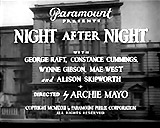


Night after Night (1932), 73 minutes, D: Archie Mayo
This was Mae West's first talking film - full of her notable wisecracks and one-liners, although she played a secondary role. Joe Anton (George Raft), a reformed thug, who had many uncouth, low-life acquaintances from his past (including Mae West), opened up a night club, and attempted to woo Park Avenue, upper-class beauty Jerry Healy (Constance Cummings). During a dinner party, blonde Mandie Triplett (Mae West), one of Joe's former girls, burst in and disrupted the proceedings with her inimitable presence and dialogue.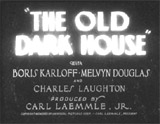



The Old Dark House (1932), 70 minutes, D: James Whale
This bizarre horror film from director James Whale featured Boris Karloff in his first film role. In the theatrically creepy story, a group of stranded travelers took shelter in the mysterious, haunted dark old house of the Femm family. The assorted collection of guests included Philip Waverton (Raymond Massey), his wife Margaret (Gloria Stuart), their friend Roger Penderell (Melvyn Douglas), Sir William Porterhouse (Charles Laughton) and his companion Gladys DuCane (Lilian Bond). The residents of the house included 102 year-old bedridden Sir Roderick Femm (Elspeth Dudgeon), a son Horace (Ernest Thesiger), daughter Rebecca (Eva Moore), and a psychotic mute butler (Boris Karloff).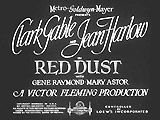


Red Dust (1932), 83 minutes, D: Victor Fleming
Director Victor Fleming's steamy classic drama was a showcase for hot-blooded chemistry between the two main stars. The film was remade as Mogambo (1953), starring Clark Gable (21 years older), Ava Gardner, and Grace Kelly. Dennis Carson (Clark Gable), head of a Indo Chinese rubber plantation, took in a female house guest - a flirtatious, glib, and earthy platinum blonde Saigon hooker named Vantine (Jean Harlow), running from the authorities. His lusty relationship with the wisecracking Vantine was put to the test when a boat arrived with newlyweds, an engineer Gary Willis (Gene Raymond) and his cultured, upper-class attractive wife Barbara "Babs" (Mary Astor), and Carson turned his attentions toward Barbara. Eventually torn between the two in a love triangle, he returned into the arms of his bawdy girlfriend Vantine, when wounded by a shot-gun blast from a jealous "Babs."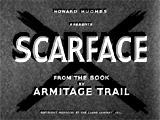



Scarface (1932) (aka Scarface, the Shame of the Nation), 90 minutes, D: Howard Hawks
Director Howard Hawks' violent, fast-paced, intense crime/gangster melodrama was the 'first' of the great gangster films, although its release was delayed due to censorship battles. It was one of the boldest, most potent, raw and violently-brutal gangster-crime films ever made. Based on Al Capone's life, the film chronicled the rise and fall of Roaring 20's tough Chicago gangster and bootlegger Tony Camonte (Paul Muni) - a brutish, primeval character. The film portrayed scandal, violence, and 28 on-camera murders, as he confronted both his own associates and rivals. The film opened with the shadowy and dark murder of "Big Louis (Louie)" Costillo (Harry J. Vejar) by his own traitorous bodyguard, Tony Camonte. Tony was fully revealed in the next scene in a barber's chair with his face and body wrapped in a towel and sheet - when unwrapped, the sheet revealed an immigrant face, and an ugly X-shaped scar on his left upper cheek (thus his nickname "Scarface"). As he was informed of Costillo's death, he was accompanied by his associate and right-hand man - the unflappable and dapper Guino Rinaldo (George Raft) (in his famous coin-flipping role). Tony was considered a prime suspect but released, and soon became allied with his new bootlegging gangster boss Johnny Lovo (Osgood Perkins, father of actor Anthony Perkins) (who had also "split" from Costillo). Tony coveted and leered at Lovo's tall, slender, flat-chested blonde mistress Poppy (Karen Morley), became infatuated with her, and vigorously pursued her away from Lovo. Lovo's strategy was to expand his bootlegging business into the South Side of town, although Tony was overexpanding into the North Side, jeopardizing their entire bootlegging racket by encroaching into Irish rival O'Hara's territory - and slowly (and ambitiously) wresting control. In the film's most controversial segments, Tony was also instinctively possessive of the honor and sexuality of his younger sister Cesca (Ann Dvorak), and wanted to control her with an incestuous passion. He didn't know she would soon develop a romantic relationship with his pal Guino. Guino (off-screen) murdered O'Hara in a North Side flower shop. Afterwards, one of the last surviving and remaining members of O'Hara's gang was Gaffney (Boris Karloff as a gangsterish-like Frankenstein), who sought revenge toward Camonte with 'bootlegged' tommy-gun weapons and his own gang. Tony evaded a drive-by ambush shooting of a restaurant where he was dining with Poppy. Tony's henchmen retaliated and waged all-out war against Gaffney's gang, and it was clear to the authorities that Tony's trigger-happy obliteration of the O'Hara gang also would meant that he would soon threaten to displace Lovo as the crime boss. After Gaffney was murdered in a bowling alley, Lovo ordered a hit on Tony, but he survived. Knowing that he had been betrayed and set up for murder, Tony ordered Guino to murder Lovo. Now as the undisputed crime boss, Tony took possession of his murdered ex-boss Lovo's mistress - the icy-cold and scheming blonde Poppy, and pointed out to her the blinking THE WORLD IS YOURS sign outside the window to reinforce his current position at the top of the underworld. The insanely-jealous and possessive Tony committed a very misguided and cold-blooded murder of his best friend Guino at his apartment building's doorway where he and Cesca lived together. Devastated, Cesca revealed that they had recently secretly married each other - she cursed her brother for being a "murderer" and a "butcher" in the fratricidal killing. The police sought to arrest Tony for the murder of Guino. He was forced to flee to the second floor of his hide-out - a steel-fortified apartment, where he was befriended by Cesca, knowing that they would surely die together during the climactic and prolonged final shootout sequence. First, Cesca was mortally-wounded when hit by a stray bullet in the mid-section, and Tony was riddled with bullets when he made a break for it in the alleyway. In the film's final ironic image, the camera moved up and away from Tony's sprawled body toward the flashing electric sign that promised Tony the world: "THE WORLD IS YOURS." [Note: In an alternate ending, Tony turned cowardly, survived the final shootout, only to stand trial and face execution.]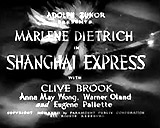


Shanghai Express (1932), 80 minutes, D: Josef von Sternberg
Director Von Sternberg's romantic adventure melodrama was one of seven enduring films teaming the director with Marlene Dietrich. It became notorious for Shanghai Lily's famous line of dialogue: "It took more than one man to change my name to Shanghai Lily." [Note: After his first film with the little-known actress, The Blue Angel (1930, Germ.), he went on to make six films in Hollywood at Paramount Studios with the popular star - Morocco (1930), Dishonored (1931), Shanghai Express (1932), Blonde Venus (1932), The Scarlet Empress (1934), and The Devil is a Woman (1935).] It was recognized for its exotic visual design (with an Academy Award win for Best Cinematography). While on the 'Shanghai Express' train traveling through civil war-torn China (from Peking to Shanghai), an ex-couple fell into the hands of revolutionaries led by a cruel Eurasian war lord Henry Chang (Warner Oland). Shanghai Lily (Marlene Dietrich), the mysterious, scandalous and erotic temptress, met her ex-lover and ex-fiancee - British army surgeon, Captain Donald "Doc" Harvey (Clive Brook). They began to rekindle their relationship but were interrupted by rebels, led by disguised businessman Chang onboard, who directed the attack on the train by his revolutionary troops and held the passengers hostage in exchange for the release of one of his top imprisoned right-hand aides. Captain Harvey was selected as Chang's prized ransom, to be exchanged for his arrested "right hand" top-ranking aide. Chang also became personally interested in Lily and propositioned her. To defend her when Chang forced himself on her, Captain Harvey broke into the room, punched Chang in the face and knocked him down to the floor. During the prisoner swap, Lily protested that she loved the Captain. Chang jealously threatened to blind him for his insolence, to force Lily to accompany him back to the palace. To insure Harvey's unharmed and safe release, Lily offered to sacrifice herself to the warlord, with her "word of honor" - and decided of her own "free will" to accompany Chang back to his palace. Another passenger, American-bred concubine Hui Fei (Anna May Wong), who was angry over being raped earlier by the rebel leader, snuck into Chang's quarters and vengefully stabbed him to death in the back. This allowed the escape of Harvey and Lily back to the train. Hui Fei fortuitously freed the Shanghai Express and all its captives to continue their journey - with arrival four hours late in Shanghai. In the conclusion at the Shanghai train station, Captain Harvey and Shanghai Lily were reconciled to each other when he finally relented, asked her to forgive him for his lack of faith in her, reaffirmed his faith in her, and asked for "another chance for a new start" - a rekindling of their relationship from the past.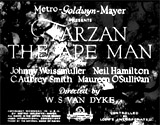


Tarzan, the Ape Man (1932), 104 minutes, D: W.S. Van Dyke
This was the first sound Tarzan film, from MGM, and one of the best renditions of Edgar Rice Burrough's classic jungle tales, with some great action and rescue sequences. An expedition led by great white hunter James Parker (C. Aubrey Smith) was searching for elephant ivory treasures in a graveyard. It was met in the wilds of Africa by an ape man of the jungle, Tarzan (Olympic swimmer Johnny Weissmuller). He kidnapped English girl Jane Parker (Maureen O'Sullivan), the daughter of the leader of the British expedition, and the two discovered their love for each other. A tense love triangle was established between Tarzan, Jane, and her English beau - Harry Holt (Neil Hamilton).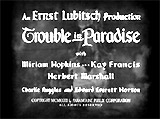
Trouble in Paradise (1932), 83 minutes, D: Ernst Lubitsch
Ernst Lubitsch's sophisticated, witty, comedy farce was the story of two jewel thieves Gaston Monescu/LaValle (Herbert Marshall) and Lily Vautier (Miriam Hopkins), who fell in love as they worked together to fleece widow Mme. Mariette Colet (Kay Francis) of her fortune, by posing as her secretary and maid. However, things didn't go as planned, as Gaston fell in love with Mariette, and was recognized by a former victim.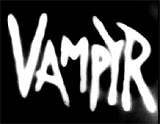

Vampyr (1932, Germ.) (aka The Vampire), 83 minutes, D: Carl Theodor Dreyer
Danish writer/director Carl Theodor Dreyer's dreamlike, atmospheric, seminal horror film (his first talkie) was loosely based on the 1872 lesbian vampire short story Carmilla by J. Sheridan Le Fanu. It was alternatively titled The Strange Adventure of David Grey - and it told the story of occult researcher Allan/David Grey (Baron Nicolas de Gunsburg, played by Julian West) in a remote country inn in the village of Courtempierre who was given a vampire combat book - "The History of Vampires". He slowly believed he was surrounded by vampires - and dreamt of his own death and glass-lidded coffin burial (filmed with a double-exposure) during a blood-loss induced fever dream.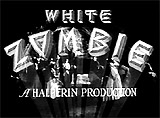

White Zombie (1932), 69 minutes, D. Victor Halperin
This was the grand-daddy of all modern-day zombie films of the sound era, with effective, atmospheric horror, although now considered dated. This was Bela Lugosi's follow-up film to Dracula (1931), and his second most important movie role. The low-budget film was the archetype and model for many subsequent zombie movies. Wealthy planter and plantation owner Charles Beaumont (Robert Frazer) invited an American couple in Haiti, Neil Parker (John Harron) and his fiancee Madeline Short (Madge Bellamy), to his plantation for their marriage. On the way, they encountered the white sorcerer-master of the Haitian sugar mill, evil voodoo master Murder Legendre (Béla Lugosi), who had stocked the plantation with an army of hollow-eyed zombies under his voodoo spell. Beaumont was the lusting admirer of Madeline, but his unrequited love was rebuffed by her plans to marry Neil. With no other alternative, jealous Beaumont hired witch-doctor Legendre to use a potion to temporarily turn Madeline into a zombie. After the marriage ceremony, Madeline was slipped the potion, apparently died, and was buried in a tomb. The plan was to have her declared legally dead and have Neil return to the US. Then, Charles could secretly revive or raise Madeline from the dead and romance her. Regretful of his evil deed and due to Legendre's own dark plans for him, Charles was also transformed into a semi-zombie figure, and imprisoned in Legendre's fortified, cliff-side castle. Neil joined with missionary Dr. Bruner (Joseph Cawthorn) to rescue Madeline from the castle, where they battled both Legendre and his threatening zombie guards. During the violent confrontation, a repentant Charles broke through the voodoo spell he was under and attacked Legendre. Both Legendre and Charles fell from the fortress tower to their deaths far below on the beach. After Legendre's death, Madeline was released from her zombie state, and returned to the arms of her loving husband Neil.